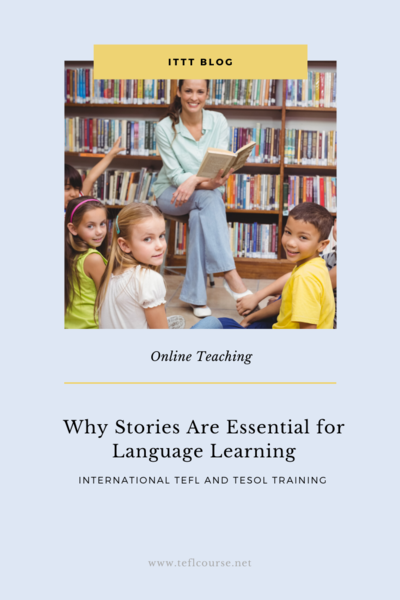Why Stories Are Essential for Language Learning

Stories are universal. They have existed in every culture and every period is known to modern man. From Neolithic cave art to Homer and from Virgil to Dostoevsky, humanity has been enthralled with stories. The most successful speakers constantly engage in bard-like tale-bearing, and, oftentimes, the songs that most resonate with listeners follow a story arch—albeit loosely.
Table of Contents
Do you want to teach English abroad? Take a TEFL course!
This post was written by our TEFL certification graduate Ryan S. Please note that this blog post might not necessarily represent the beliefs or opinions of ITTT.
Theory Support
Total enthrallment with television and movies proves this theory to be true beyond a shadow of a doubt. People like stories; mankind loves them. It is for these reasons that storytelling has become a central part of education in general and language learning more specifically. Grammar lessons and worksheets are important. However, students connect and learn from stories in ways that other pedagogical practices cannot compete with fully. Stories are easily understandable, they provide ethical and practical wisdom, and they are deeply engaging and enjoyable.

Also Read: How many roles does an ESL teacher serve in the classroom?
Early Years
From the moment a child is born, they encounter a world of stories. An infant's first and only job is to understand these tales and conflicts. They recognize the vital importance of engaging with, even "writing" their own stories. Children learn the language as a part of this process. It is clear from the cries and giggles of infants that they naturally want to be understood; unfortunately, their communicative abilities are rather limited, unspecific, and lacking depth. The solution to these problems is Mercury's gift to mankind: language. Through the process of enculturation and early childhood development, toddlers and children learn to speak and read so that they might interact meaningfully with the great dramas playing out around them. While they may understand nothing of the grammar that goes into their words, though they cannot comprehend the works of great poets such as Dante or Donne, they can comprehend stories. This is why teachers must utilize stories as a path to language acquisition. It is the most natural way to learn a tongue. When children are very young, it can be one of the only ways to successfully teach a new language in the classroom.
Also Read: What's the best way to apply for TEFL jobs?
Essence of Stories
The reason for this stems from the pragmatic, even ethical, aspects of stories. Not only are they easily understood, but they also provide one of the most basic ways to transfer knowledge. This is evident from the most ancient stories that we have in our collections today. The Enuma Elish, Odyssey, and Torah are all documents containing ancient tales passed down through the centuries. These stories have survived the plagues, censorship, and wars that destroyed most of their contemporary tales and stories because they provide instruction on how to live. The Torah is a good example of this because in Hebrew the name means "instruction" or "teaching."
Furthermore, the majority of the Torah is filled with stories, not laws, about creation, flood, giants, etc. The only major thread is that these stories were meant to shape how their audiences lived. In recent history, stories such as Huckleberry Finn and The Count of Monte Cristo both fall under the same umbrella. Stories cannot become classics unless they fulfill more than our need for entertainment. They must strike at what it means to live. The good thing about the pragmatic nature of the classics is that almost (if not all) stories have at least a minute amount of wisdom. Unlike grammar, which will only help one speak or write, stories can teach their audience how to engage with the world, and it is this that makes them so engaging in the classroom.

Also Read: 11 Cambridge English Exams You Need to Know About Right Now!
Attention-Grabbing Effect
They are not only engaging but enjoyable as well. Children, teenagers, and adults all get joy when they interact with a good tale. Movie theaters are good examples of this because strangers from all walks of life will come together for one to three hours and sit completely bewitched by moving pictures on a screen. They laugh together; they cry together. Sometimes, they even scream in weirdly sadistic harmony. Teachers drool over the possibility of having a class be so engaged by their lessons. Many instructors would give up a year's salary or more if they could have their students be so intertwined with their study material. Furthermore, there are hundreds of pedagogical strategies that strive to give teachers even a glimpse of such paradisal bliss. Yet, stories have been doing that since the first bard chanted his first epic back in the dawn of time.
Do you want to teach English abroad? Take a TEFL course!
It is stories, then, that teachers must use to teach language. Of course, one must not teach only tall-tales or have their students spend the entirety of their class time concocting bizarre narratives. However, due to their fundamentally understandable nature, they are the perfect tool to not only entertain, but teach. A good teacher could hide hundreds of new words, phrases, grammar rules, and linguistics functions into their stories over a year. Furthermore, students, especially children, will remember and use that language naturally because they received in naturally. By using stories, students will understand better, learn better, and engage more fully with their school work. It is for these reasons that stories are central to language, and, with any luck, to language classrooms as well.
Apply now & get certified to teach english abroad!
Speak with an ITTT advisor today to put together your personal plan for teaching English abroad.
Send us an email or call us toll-free at 1-800-490-0531 to speak with an ITTT advisor today.
Related Articles:
- Guide To Writing A TEFL Resume That Will Get You Hired
- 10 Questions You Need to Ask Before Enrolling In a TEFL Course
- Step-By-Step Guide To Legally Teaching English in South Korea
- Online or In-Class - Which TEFL Course Should You Take?
- TEFL Breakdown - What Subjects Will Your TEFL Course Cover?
- Teaching English In China - The Salary and Budget Guide




